Stanford Seminar on China in South Asia on Feb. 21, 2017 [Report]
Stanford Seminar: "China in South Asia's New Strategic Quadrangle"
Date/Time: February 21(T), 2017, 4:30-6:00pm
Venue: Philippines Conference Room, Encina Hall, Stanford
Sponsored by: Shorenstein Asia-Pacific Research Center
Speaker: Evan A. Feigenbaum, Vice Chairman, The Paulson Institute
Webpage: http://fsi.stanford.edu/events/china-south-asia%E2%80%99s-new-strategic-quadrangle
"South Asia is one of the least economically integrated regions of the world, but its future can no longer be divorced from broader trends in a dynamic, volatile, yet increasingly integrated Asia........ In this talk, Feigenbaum will explore China's changing role in South Asia but especially the complex interaction there among four big powers ("Asia's new strategic quadrangle) - India, China, the US, and Japan"
Dr. Evan Feigenbaum's talk and Q&A session
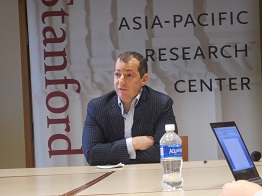
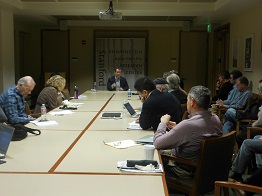
Comment: Despite its regionally focused title, the actual talk encompassed a whole range of strategic and economic changes in Asia and the Pacific rim. A strong message of the speaker emerged toward the end of his talk, especially during the Q&A session, that there seems to be no single, unified policy approach to various countries and regions on the part of China to dominate the whole region or the world for that matter, as is often feared by Western observers. This means that even if the US withdraws from some of the region-wide activities in Asia Pacific such as TPP, China could not automatically become the dominant strategic and economic power in the region; an "anti-alarmist" argument which reminds us of Dr. Harold Trinkunas' seminar on "China's role in Latin America" at Stanford on Feb. 1, 2017. See the following report:
Harold Trinkunas (Center for Int'l Security & Cooperation, Stanford) "A 'Comprehensive and Cooperative Partnership'?: Assessing China's Role in Latin America"
http://miyao-blog.blog.so-net.ne.jp/2017-02-02
(Takahiro Miyao)
-----------------------------------------------------------------------------------
Date/Time: February 21(T), 2017, 4:30-6:00pm
Venue: Philippines Conference Room, Encina Hall, Stanford
Sponsored by: Shorenstein Asia-Pacific Research Center
Speaker: Evan A. Feigenbaum, Vice Chairman, The Paulson Institute
Webpage: http://fsi.stanford.edu/events/china-south-asia%E2%80%99s-new-strategic-quadrangle
"South Asia is one of the least economically integrated regions of the world, but its future can no longer be divorced from broader trends in a dynamic, volatile, yet increasingly integrated Asia........ In this talk, Feigenbaum will explore China's changing role in South Asia but especially the complex interaction there among four big powers ("Asia's new strategic quadrangle) - India, China, the US, and Japan"
Dr. Evan Feigenbaum's talk and Q&A session


Comment: Despite its regionally focused title, the actual talk encompassed a whole range of strategic and economic changes in Asia and the Pacific rim. A strong message of the speaker emerged toward the end of his talk, especially during the Q&A session, that there seems to be no single, unified policy approach to various countries and regions on the part of China to dominate the whole region or the world for that matter, as is often feared by Western observers. This means that even if the US withdraws from some of the region-wide activities in Asia Pacific such as TPP, China could not automatically become the dominant strategic and economic power in the region; an "anti-alarmist" argument which reminds us of Dr. Harold Trinkunas' seminar on "China's role in Latin America" at Stanford on Feb. 1, 2017. See the following report:
Harold Trinkunas (Center for Int'l Security & Cooperation, Stanford) "A 'Comprehensive and Cooperative Partnership'?: Assessing China's Role in Latin America"
http://miyao-blog.blog.so-net.ne.jp/2017-02-02
(Takahiro Miyao)
-----------------------------------------------------------------------------------
"How to Debate" for Students from Kyushu U.: 九大生のための「ディベートの仕方」 [Report]
Lecture on "How to Debate" for Students from Kyushu U.@SJSU Campus
九大生グループのための「ディベートのやり方」の講義@サンノゼ州立大学キャンパス
Date/Time: 2/21(T), 2017, 1:30-2:15pm; 日時 2月21日(火)13:30~14:15
Place: SJSU Engineering Building: 場所 サンノゼ州立大学・工学部ビル
A brief instruction about "how to debate" was given to a group of students from Kyushu University, participating in their five-week training program in Silicon Valley. Their actual debate exercise will be held in late March.
シリコンバレーで5週間の研修を受けている九州大学の学生たちに「ディベートのやり方」についての講義があった。ディベートの実習は3月後半に実施される予定。
SJSU Campus Scene; サンノゼ州立大学のキャンパス風景
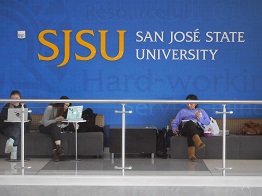
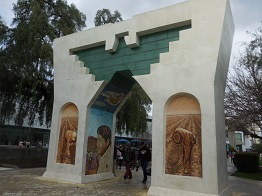
Engineering Building & Student Union; 工学部ビルと学生食堂周辺の様子
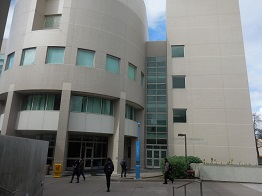
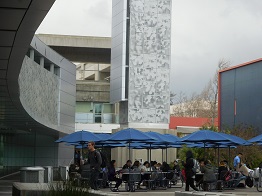
Dr Matsuo's introduction & Dr Miyao's lecture; 松尾氏による紹介と宮尾氏の講義
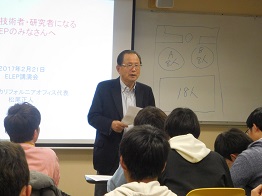
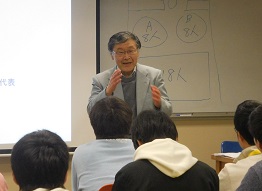
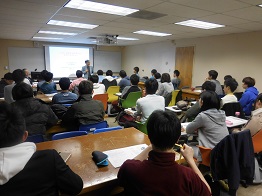
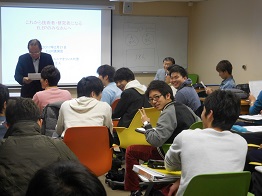
References; 参考
1. "Debate Manual" (Illustrations by T. Miyao): https://youtu.be/xfLQAUzikkQ
2. 「ディベートの手引き」(絵・宮尾尊弘): https://youtu.be/4V9tlXwtypo
----------------------------------------------------------------------------------------
九大生グループのための「ディベートのやり方」の講義@サンノゼ州立大学キャンパス
Date/Time: 2/21(T), 2017, 1:30-2:15pm; 日時 2月21日(火)13:30~14:15
Place: SJSU Engineering Building: 場所 サンノゼ州立大学・工学部ビル
A brief instruction about "how to debate" was given to a group of students from Kyushu University, participating in their five-week training program in Silicon Valley. Their actual debate exercise will be held in late March.
シリコンバレーで5週間の研修を受けている九州大学の学生たちに「ディベートのやり方」についての講義があった。ディベートの実習は3月後半に実施される予定。
SJSU Campus Scene; サンノゼ州立大学のキャンパス風景


Engineering Building & Student Union; 工学部ビルと学生食堂周辺の様子


Dr Matsuo's introduction & Dr Miyao's lecture; 松尾氏による紹介と宮尾氏の講義




References; 参考
1. "Debate Manual" (Illustrations by T. Miyao): https://youtu.be/xfLQAUzikkQ
2. 「ディベートの手引き」(絵・宮尾尊弘): https://youtu.be/4V9tlXwtypo
----------------------------------------------------------------------------------------
Revisit to SF Bay Area (2017/1/31-2/2): SFベイエリア再訪 [Report]
Visit to SF Bay Area (1/31-2/2, 2017): SFベイエリア訪問(2017/1/31-2/2)
Main purposes: To give a "Certificate of Appreciation" to outgoing JUNBA Chair & Osaka Univ. office head Mr. Kabasawa, and consult with Kyushu Univ. office head Mr. Matsuo about my upcoming debate class for his student group, as well as to attend three Stanford seminars on Japan and China.
訪問の主目的: 間もなくJUNBA(ベイエリア大学ネットワーク)代表と阪大北米センター長の職を退く樺澤氏に「感謝状」を贈呈し、また九大カリフォルニアオフィス代表の松尾氏とディベート実施について相談するとともに、日本と中国に関する3つのスタンフォード大セミナーに参加すること。
Day 1: January 31(T) ; 1日目:1月31日(火)
Revisiting Osaka Univ. Office in SF: 大阪大学北米センター・樺澤氏再訪
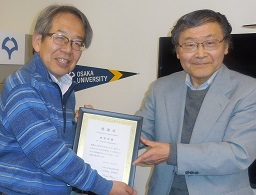
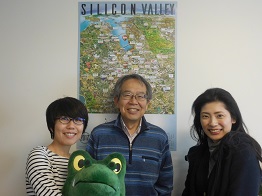
Revisiting JSPA Office in Berkeley: JSPSオフィス・田宮氏再訪
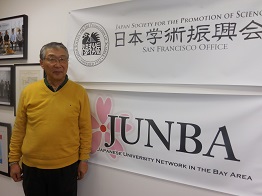
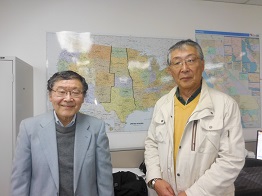
Seminar on Japanese Women in Business: スタンフォードセミナー「日本の女性とビジネス」
@Stanford Univ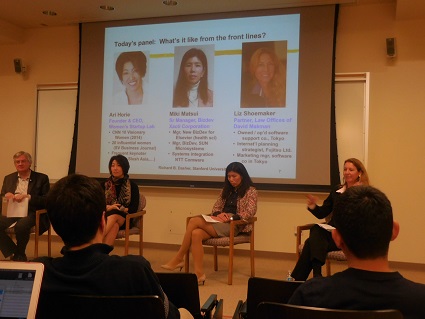
-------------------------------------------------------------------------------
Day 2: February 1(W) ; 2日目:2月1日(水)
Attending two seminars on Japan & China; 日本と中国についてのセミナー参加
Venue: Encina Hall, Stanford University; 場所:スタンフォート大学エンシナホール
Seminar report: セミナー報告: http://miyao-blog.blog.so-net.ne.jp/2017-02-02
Seminar 1) 12:00-1:30pm; セミナー1:12:00-13:30
"Corporate Governance Reform in Japan"; 「日本の企業統治改革」
Speaker: Hideaki Miyajima (Waseda Univ); 宮島英昭早稲田大学教授
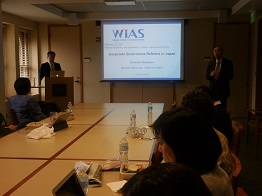
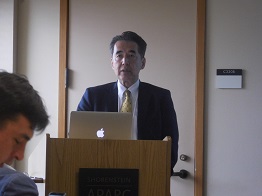
Seminar 2) 4:30-6:00pm; セミナー2: 16:30-18:00
"A 'Comprehensive and Cooperative Partnership'?: China's Role in Latin America";
「包括的で協力的なパートナーシップか?:中南米での中国の役割」
Speaker: Harold Trinkunas (Center for Int'l Security & Cooperation, Stanford)
Moderator/Commentator: Thomas Fingar (FSI, Stanford Univ.)
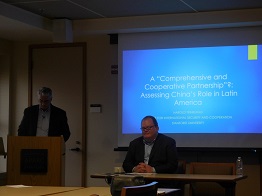
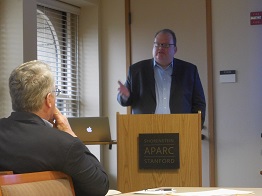
--------------------------------------------------------------------------------
Day 3: February 2(Th) ; 3日目:2月2日(木)
Revisiting Kyushu Univ. Office to meet Mr. Matsuo & visiting Univ. members
九州大学オフィスで松尾代表および訪問中の山田淳九大教授グループと会合
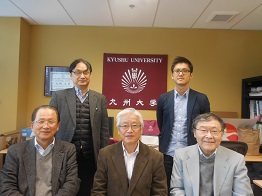
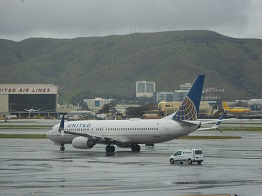
Leaving SFO for LAX in the afternoon: 午後にSF空港発でLAへ
---------------------------------------------------------------------------------
Main purposes: To give a "Certificate of Appreciation" to outgoing JUNBA Chair & Osaka Univ. office head Mr. Kabasawa, and consult with Kyushu Univ. office head Mr. Matsuo about my upcoming debate class for his student group, as well as to attend three Stanford seminars on Japan and China.
訪問の主目的: 間もなくJUNBA(ベイエリア大学ネットワーク)代表と阪大北米センター長の職を退く樺澤氏に「感謝状」を贈呈し、また九大カリフォルニアオフィス代表の松尾氏とディベート実施について相談するとともに、日本と中国に関する3つのスタンフォード大セミナーに参加すること。
Day 1: January 31(T) ; 1日目:1月31日(火)
Revisiting Osaka Univ. Office in SF: 大阪大学北米センター・樺澤氏再訪


Revisiting JSPA Office in Berkeley: JSPSオフィス・田宮氏再訪


Seminar on Japanese Women in Business: スタンフォードセミナー「日本の女性とビジネス」
@Stanford Univ

-------------------------------------------------------------------------------
Day 2: February 1(W) ; 2日目:2月1日(水)
Attending two seminars on Japan & China; 日本と中国についてのセミナー参加
Venue: Encina Hall, Stanford University; 場所:スタンフォート大学エンシナホール
Seminar report: セミナー報告: http://miyao-blog.blog.so-net.ne.jp/2017-02-02
Seminar 1) 12:00-1:30pm; セミナー1:12:00-13:30
"Corporate Governance Reform in Japan"; 「日本の企業統治改革」
Speaker: Hideaki Miyajima (Waseda Univ); 宮島英昭早稲田大学教授


Seminar 2) 4:30-6:00pm; セミナー2: 16:30-18:00
"A 'Comprehensive and Cooperative Partnership'?: China's Role in Latin America";
「包括的で協力的なパートナーシップか?:中南米での中国の役割」
Speaker: Harold Trinkunas (Center for Int'l Security & Cooperation, Stanford)
Moderator/Commentator: Thomas Fingar (FSI, Stanford Univ.)


--------------------------------------------------------------------------------
Day 3: February 2(Th) ; 3日目:2月2日(木)
Revisiting Kyushu Univ. Office to meet Mr. Matsuo & visiting Univ. members
九州大学オフィスで松尾代表および訪問中の山田淳九大教授グループと会合


Leaving SFO for LAX in the afternoon: 午後にSF空港発でLAへ
---------------------------------------------------------------------------------
Stanford Seminars on Japan & China on Feb. 1, 2017 [Report]
Stanford Seminars on Japan and China
Date: February 1(W), 2017
Venue: Philippines Conference Room, Encina Hall, Stanford Univeristy
1) 12:00-1:30pm
"Corporate Governance Reform in Japan": Japan Colloquium Series
Speaker: Hideaki Miyajima (Waseda University)
Moderator/Commentator: Takeo Hoshi (FSI, Stanford University)
(From seminar abstract):
Since Abenomics launched corporate governance reforms as the third arrow of its policies mix, a series of reform measures were introduced such as Stewardship Code, Corporate Governance Code, organizing JPX 400 by Tokyo Stock Exchange. In this presentation, first, recent changes of governance arrangement in Japanese firms are summarized, and some agenda for further reforms is suggested.


Prof. Hideaki Miyajima: http://www.rieti.go.jp/users/miyajima-hideaki/
(English) http://www.rieti.go.jp/users/miyajima-hideaki/index_en.html
(Miyao's report):
Very informative presentation about recent developments in corporate governance reform in Japan. A more detailed account of current issues on this subject matter should be found in Prof. Miyajima's forthcoming book "Corporate Governance and Growth Strategy" (「企業統治と成長戦略」to be published soon, as he pointed out. From the viewpoint of economic theorists like myself, it was quite interesting to hear from him that the current "hybrid" arrangement of Japanese corporate organization, combining the traditional "Japan model" and the "US model" of corporate governance, appears to be stable, contrary to theoretical intuition. Prof. Miyajima did not provide an explanation about this stability property, other than saying that many of the Japanese representative firms seem to have been in some hybrid situation for more than a decade without showing any sign to go to either the purely Japanese or US model. Hopefully in his forthcoming book, at least some more detailed, especially theoretical, account will be presented to persuade both theorists and empiricists on this matter.
2) 4:30-6:00pm
"A 'Comprehensive and Cooperative Partnership'?: Assessing China's Role in Latin America": Asia-Pacific Research Center Event
Speaker: Harold Trinkunas (Center for Int'l Security & Cooperation, Stanford)
Moderator/Commentator: Thomas Fingar (FSI, Stanford Univ.)
(From seminar abstract):
Latin American trade with China has grown exponentially since 2000. Major loans and investments also add to China’s growing role in the region’s economy. China has become an important alternative for capital, trade and technology for Latin America, but without the policy conditionality that regional governments have traditionally experienced in relations with developed countries. As part of a project on China-Latin American relations at the Brookings Institution, Harold Trinkunas assesses how China’s growing economic relations actually influence politics and policies across the region.


Harold Trinkunas: http://cisac.fsi.stanford.edu/people/harold-trinkunas
Thomas Fingar: http://aparc.fsi.stanford.edu/people/thomas_fingar
(Miyao's report):
Very comprehensive and balanced analysis of China's political, economic, and strategic influence in the Latin American region. However, the bottom line conclusion of the speaker's (and the commentator's) argument was something like "China's influence on Latin America in the foreseeable future would be more limited than generally perceived, regardless of what happens to the both Chinese and American sides (even under the Trump administration), in view of the long-term relationship between Latin America and the advanced Western countries, especially the US, still dominating Latin American economies," a view which is not so easily subscribed to by Asian observers like myself, who are more concerned about China's hegemony in Asia and the Pacific-rim region including some Latin American countries, especially in the aftermath of the failure of TPP. as I questioned to these two specialists, who answered my question by saying that the US could effectively deal with Pacific-rim nations even in a bilateral fashion, as US President Trump suggested. We all hope so.
-------------------------------------------------------------------------------------------
Date: February 1(W), 2017
Venue: Philippines Conference Room, Encina Hall, Stanford Univeristy
1) 12:00-1:30pm
"Corporate Governance Reform in Japan": Japan Colloquium Series
Speaker: Hideaki Miyajima (Waseda University)
Moderator/Commentator: Takeo Hoshi (FSI, Stanford University)
(From seminar abstract):
Since Abenomics launched corporate governance reforms as the third arrow of its policies mix, a series of reform measures were introduced such as Stewardship Code, Corporate Governance Code, organizing JPX 400 by Tokyo Stock Exchange. In this presentation, first, recent changes of governance arrangement in Japanese firms are summarized, and some agenda for further reforms is suggested.


Prof. Hideaki Miyajima: http://www.rieti.go.jp/users/miyajima-hideaki/
(English) http://www.rieti.go.jp/users/miyajima-hideaki/index_en.html
(Miyao's report):
Very informative presentation about recent developments in corporate governance reform in Japan. A more detailed account of current issues on this subject matter should be found in Prof. Miyajima's forthcoming book "Corporate Governance and Growth Strategy" (「企業統治と成長戦略」to be published soon, as he pointed out. From the viewpoint of economic theorists like myself, it was quite interesting to hear from him that the current "hybrid" arrangement of Japanese corporate organization, combining the traditional "Japan model" and the "US model" of corporate governance, appears to be stable, contrary to theoretical intuition. Prof. Miyajima did not provide an explanation about this stability property, other than saying that many of the Japanese representative firms seem to have been in some hybrid situation for more than a decade without showing any sign to go to either the purely Japanese or US model. Hopefully in his forthcoming book, at least some more detailed, especially theoretical, account will be presented to persuade both theorists and empiricists on this matter.
2) 4:30-6:00pm
"A 'Comprehensive and Cooperative Partnership'?: Assessing China's Role in Latin America": Asia-Pacific Research Center Event
Speaker: Harold Trinkunas (Center for Int'l Security & Cooperation, Stanford)
Moderator/Commentator: Thomas Fingar (FSI, Stanford Univ.)
(From seminar abstract):
Latin American trade with China has grown exponentially since 2000. Major loans and investments also add to China’s growing role in the region’s economy. China has become an important alternative for capital, trade and technology for Latin America, but without the policy conditionality that regional governments have traditionally experienced in relations with developed countries. As part of a project on China-Latin American relations at the Brookings Institution, Harold Trinkunas assesses how China’s growing economic relations actually influence politics and policies across the region.


Harold Trinkunas: http://cisac.fsi.stanford.edu/people/harold-trinkunas
Thomas Fingar: http://aparc.fsi.stanford.edu/people/thomas_fingar
(Miyao's report):
Very comprehensive and balanced analysis of China's political, economic, and strategic influence in the Latin American region. However, the bottom line conclusion of the speaker's (and the commentator's) argument was something like "China's influence on Latin America in the foreseeable future would be more limited than generally perceived, regardless of what happens to the both Chinese and American sides (even under the Trump administration), in view of the long-term relationship between Latin America and the advanced Western countries, especially the US, still dominating Latin American economies," a view which is not so easily subscribed to by Asian observers like myself, who are more concerned about China's hegemony in Asia and the Pacific-rim region including some Latin American countries, especially in the aftermath of the failure of TPP. as I questioned to these two specialists, who answered my question by saying that the US could effectively deal with Pacific-rim nations even in a bilateral fashion, as US President Trump suggested. We all hope so.
-------------------------------------------------------------------------------------------



